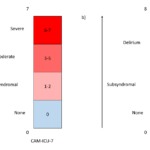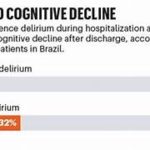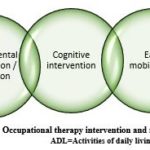Leah Acker, MD, PhD, Assistant Professor of Anesthesiology, Duke University Medical Center, Durham, NC Outside of the delirium field, less complex physiological output signals often are associated with increased risk of geriatric syndromes. For example, an increased risk of falls is associated with less complex musculoskeletal adjustment movements.1 Overall, less complex physiological signals are associated […]
Tag Archives: delirium research
Cognitive Prehabilitation to Prevent Postoperative Delirium
Contributed by Brian O’Gara MD MPH Department of Anesthesiology, Beth Israel Deaconess Medical Center, Boston, MA Postoperative delirium occurs in 15-50% of older surgical patients, and increases the risk of postoperative complications, hospital mortality and long-term cognitive dysfunction.1 Hospital -based multicomponent interventions can prevent postoperative delirium, but these approaches are only 30-40% effective.2 Therefore, there is […]
Studying Delirium in the Neurocritical Care Unit: Improving Detection and Outcomes in Patients with Stroke
Michael Reznik, MD Assistant Professor of Neurology & Neurosurgery. Brown University, Alpert Medical School I’ve been interested in brain science, consciousness, and cognition for as long as I can remember, and it was through the lens of these interests that I opted to pursue a career in neurology. I found myself especially interested in patients […]
Discordance between ICDSC and CAM-ICU-7 as measures of delirium severity in the ICU
Karla D. Krewulak PhD and Kirsten M. Fiest PhD Department of Critical Care Medicine, University of Calgary, Calgary, AB, Canada Determination of delirium presence or absence may no longer be sufficient when tools exist to measure a delirium score which may be used to estimate delirium severity. Measurement of delirium severity has been identified as […]
Delirium, Dementia, and Adverse Outcomes
Contributed by Thiago J. Avelino-Silva, MD, PhD*; Flávia B. Garcez, MD, PhD* *Faculty of Medicine, University of São Paulo, São Paulo, Brazil Delirium results from an intricate combination of dozens of possible predisposing and precipitating factors1. Older age, functional dependence, and preexisting cognitive impairment are key determinants for its occurrence, but the latter is a […]
Occupational Therapy: Strategies for Delirium Management
Contributed by Evelyn Alvarez1,2,3 & Juan Pablo Saa4 1 Centro de Estudios en Neurociencia Humana y Neuropsicología, Facultad de Psicología, Universidad Diego Portales, Chile, 2 Facultad de Ciencias de la Salud, Universidad Central de Chile, Chile, 3 Departamento de Terapia Ocupacional y Ciencia de la Ocupación, Facultad de Medicina, Universidad de Chile, Chile, 4 Florey […]
Life Changing: Early Delirium Identification and Intervention
Contributed by Kimberly Oosterhouse, PhD, RN, CNE, Loyola University Chicago, NIDUS Pilot Grant Awardee “Kim, I think this is it; she is not responding to me. Can you please come and be with us?” These are the words I woke up to one morning 16 years ago. My distraught grandfather called me from the inpatient […]
Delirium Research Profile: Sangil Lee, MD
Hi everyone, My name is Sangil Lee, and I am currently working at the University of Iowa Carver College of Medicine as a clinical associate professor. Tell us how you got started in delirium research. My passion for clinical research has been with me since I became a physician in 2005, when […]
Screening for delirium with the Confusion Assessment Method (CAM)
Contributed by Sharon K. Inouye, M.D., MPH; Richard N. Jones, ScD; Edward R. Marcantonio, M.D., SM Overview The Confusion Assessment Method (CAM) was published in 19901 in a highly cited article in the Annals of Internal Medicine as the first brief, standardized method for identification of delirium at the bedside. It provided a standardized rating […]
Delirium Research Hub Spotlight – Kenneth Boockvar, MD, MS
Every other month, the Delirium Research Hub selects an investigator and research study included in the Delirium Research Hub to feature as a Spotlight Investigator. This month, we are featuring Dr. Kenneth Boockvar, MD, MS for his study “An Adapted Hospital Elder Life Program to Prevent Delirium and Reduce Complications of Acute Illness in Long […]








